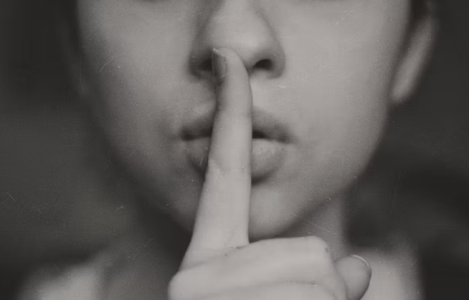Think you can spot a liar? You might be looking in the wrong place
- Replies 0
We’ve all wondered if someone was being honest with us. Maybe it was a job interview, a first date, or a tense family moment.
While most of us focus on eye contact or fidgeting hands, experts say the truth might be hiding somewhere we rarely think to check.
And it turns out, our instincts could be missing a key signal.
Juan Manuel García López, a non-verbal communication specialist trained by the FBI, says that the most overlooked—and most honest—part of the body is the feet.
“We are always transmitting messages, consciously or unconsciously,” López told La Vanguardia.
Most people try to control their face and posture, but forget their feet are still talking. Whether you're nervous, bored, or scared, your feet might reveal the truth before you even speak.

López explained that stillness or excessive rigidity is often a red flag.
“When someone stays completely still or overly rigid, it usually indicates fear or that they have something to hide,” he said.
These reactions can be involuntary and are often triggered by fear, sorrow, or even excitement. Subtle changes—like dilated pupils, blushing, or flaring nostrils—are nearly impossible to fake and offer insight into what someone is truly feeling.
He emphasized the contradiction between words and body language.
“If I tell you I'm relaxed and happy with you, but my joints are tense and my posture is stiff, there's a clear contradiction,” López said.
The feet, he claims, are one of the most telling body parts, since people rarely think to consciously control them.
Someone may face you while talking, but if their feet are pointed toward the door, it often signals they want to leave.
This doesn’t always mean someone is lying—it could mean they’re anxious, bored, or in a hurry.
López says it's up to the observer to interpret why. He also warns that people can learn to mimic convincing physical cues to mislead others.
“I can use my body language to trick your brain into thinking I feel something I don't,” he explained.
That could include faking warmth or friendliness to create a sense of reciprocity, making others believe the connection is mutual.
This manipulation can be subtle but powerful in interviews, sales, or personal relationships.
That’s why understanding non-verbal behavior in context is so important.
One body signal doesn’t mean someone’s guilty—but a combination can start to paint a different picture.
López’s insights come in the wake of a separate FBI perspective from retired agent Steve Lazarus, who issued a warning about at-home DNA testing kits.
In a viral online video, Lazarus advised viewers to stay far away from services that claim to reunite long-lost relatives. “And if you wanted a reason, in one word, it’s privacy,” he said. In 2019, a Florida detective was granted a court order to blindly search over a million DNA records for one case.
Lazarus noted that these databases are vulnerable to hacking or even changing ownership, possibly leading to data misuse or health discrimination.
While DNA kits promise safety and transparency, Lazarus said there's no guarantee your most sensitive information stays in the right hands.
“Do you really think a health insurance company wouldn’t want a copy of your DNA?” he asked.
The risks, he warns, may be far greater than most users realize.
Both experts—López in body language and Lazarus in data security—remind us that what’s hidden often matters more than what’s said aloud.
Whether it’s unconscious foot placement or a quiet clause in a privacy policy, the smallest signs can say the most.
In a world full of filtered photos and rehearsed conversations, knowing what to watch for gives you a real edge. Because sometimes, the truth lies at your feet.
Also read:

Have you ever noticed someone’s body language give away more than their words? What clues do you trust when trying to read someone? Share your observations and stories in the comments—your experience could help someone else spot the signs.
While most of us focus on eye contact or fidgeting hands, experts say the truth might be hiding somewhere we rarely think to check.
And it turns out, our instincts could be missing a key signal.
Juan Manuel García López, a non-verbal communication specialist trained by the FBI, says that the most overlooked—and most honest—part of the body is the feet.
“We are always transmitting messages, consciously or unconsciously,” López told La Vanguardia.
Most people try to control their face and posture, but forget their feet are still talking. Whether you're nervous, bored, or scared, your feet might reveal the truth before you even speak.

The most overlooked—and most honest—part of the body is the feet. Image source: Kristina Flour / Unsplash
López explained that stillness or excessive rigidity is often a red flag.
“When someone stays completely still or overly rigid, it usually indicates fear or that they have something to hide,” he said.
These reactions can be involuntary and are often triggered by fear, sorrow, or even excitement. Subtle changes—like dilated pupils, blushing, or flaring nostrils—are nearly impossible to fake and offer insight into what someone is truly feeling.
He emphasized the contradiction between words and body language.
“If I tell you I'm relaxed and happy with you, but my joints are tense and my posture is stiff, there's a clear contradiction,” López said.
The feet, he claims, are one of the most telling body parts, since people rarely think to consciously control them.
Someone may face you while talking, but if their feet are pointed toward the door, it often signals they want to leave.
This doesn’t always mean someone is lying—it could mean they’re anxious, bored, or in a hurry.
López says it's up to the observer to interpret why. He also warns that people can learn to mimic convincing physical cues to mislead others.
“I can use my body language to trick your brain into thinking I feel something I don't,” he explained.
That could include faking warmth or friendliness to create a sense of reciprocity, making others believe the connection is mutual.
This manipulation can be subtle but powerful in interviews, sales, or personal relationships.
That’s why understanding non-verbal behavior in context is so important.
One body signal doesn’t mean someone’s guilty—but a combination can start to paint a different picture.
López’s insights come in the wake of a separate FBI perspective from retired agent Steve Lazarus, who issued a warning about at-home DNA testing kits.
In a viral online video, Lazarus advised viewers to stay far away from services that claim to reunite long-lost relatives. “And if you wanted a reason, in one word, it’s privacy,” he said. In 2019, a Florida detective was granted a court order to blindly search over a million DNA records for one case.
Lazarus noted that these databases are vulnerable to hacking or even changing ownership, possibly leading to data misuse or health discrimination.
While DNA kits promise safety and transparency, Lazarus said there's no guarantee your most sensitive information stays in the right hands.
“Do you really think a health insurance company wouldn’t want a copy of your DNA?” he asked.
The risks, he warns, may be far greater than most users realize.
Both experts—López in body language and Lazarus in data security—remind us that what’s hidden often matters more than what’s said aloud.
Whether it’s unconscious foot placement or a quiet clause in a privacy policy, the smallest signs can say the most.
In a world full of filtered photos and rehearsed conversations, knowing what to watch for gives you a real edge. Because sometimes, the truth lies at your feet.
Also read:
- A body language guru reveals the instant trick to spotting liars
- How one word could reveal a lie—and what it means for your daily life
Key Takeaways
- FBI-trained body language expert Juan Manuel García López says feet are the most revealing part of the body when someone is lying.
- Signs like rigid posture, blushing, or feet pointing toward the door can expose fear or hidden intentions even if someone speaks confidently.
- People can manipulate body language to create false emotional signals, which is why full-body observation matters.
- Retired FBI agent Steve Lazarus warned against home DNA test kits, citing major privacy risks including misuse by law enforcement and insurers.






